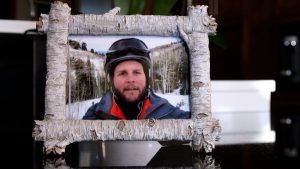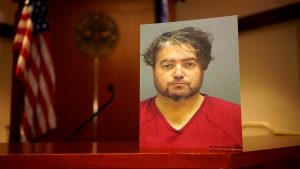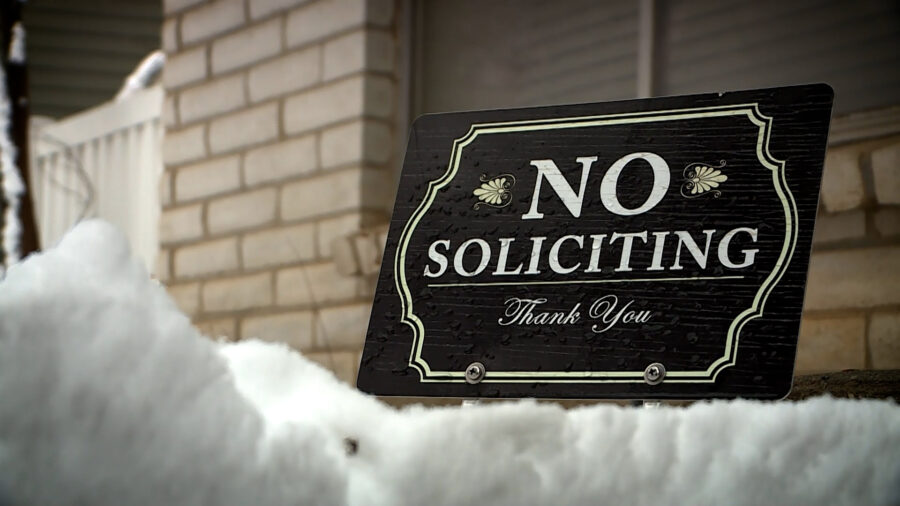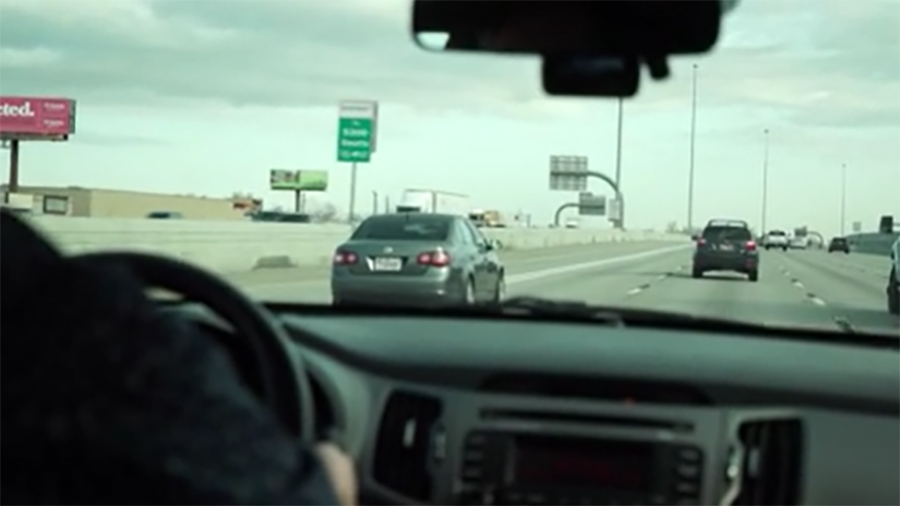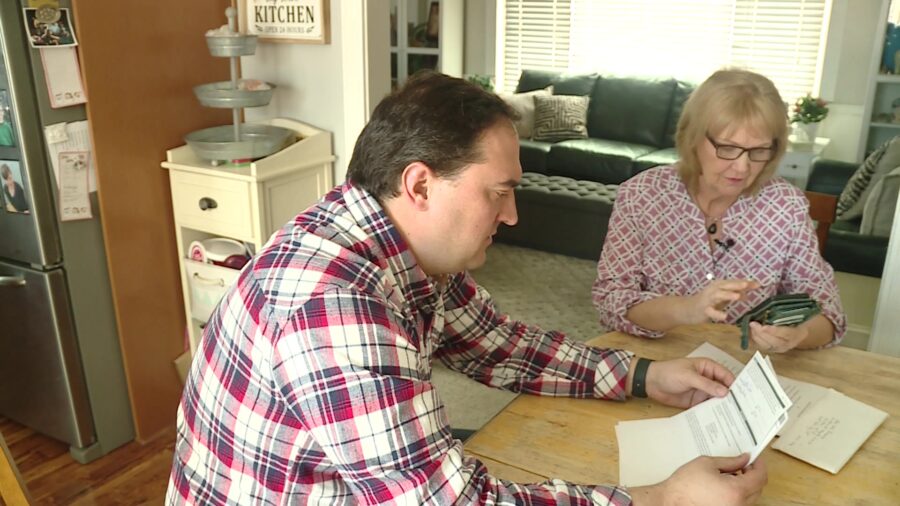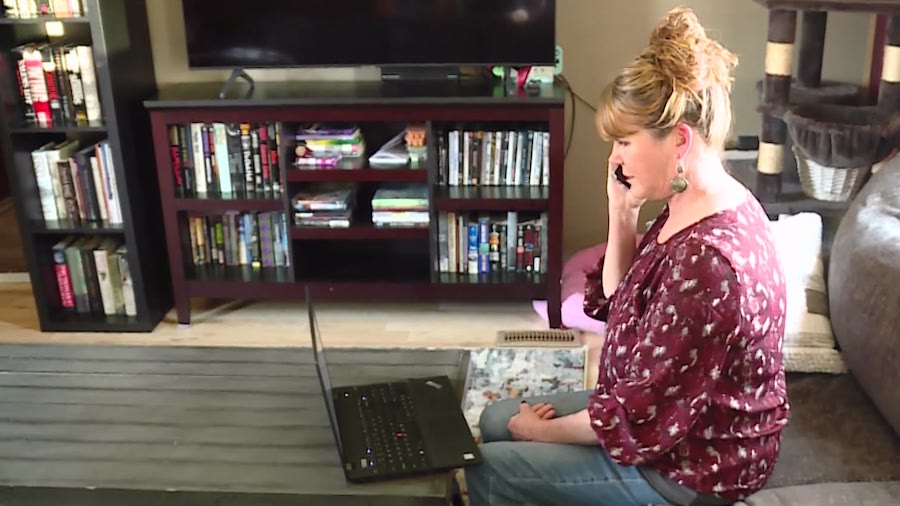KSL INVESTIGATES
‘It’s not working’: KSL Investigates unintended consequences of new Utah self-defense law
Nov 15, 2021, 10:34 PM | Updated: Nov 16, 2021, 11:51 am
SALT LAKE CITY – The Utah Legislature passed a new law this year aimed at strengthening self-defense rights in the state – but six months after the legislation went into effect, the KSL Investigators found unintended consequences are impacting victims of crime.
House Bill 227 became law with little fanfare, but state records show lawmakers were warned the legislation’s significant change to criminal prosecutions could have negative results.
The lawmaker behind the bill maintains that it’s a well-working statute, but some who’ve experienced its impacts first-hand now say while the legislation might be well-intentioned, it’s leading to bad outcomes.
‘How can that be?’
Park City mother Kay Lynn Stafford is one of them. Memories and photos of her son, 40-year-old Cory Haney, are all she has left to hold on to.
“He just would light up a room when he walked in,” she said. “I know you hear that a lot, but that really was our Cory.”
Remembering him as her adventurous child, Stafford said Haney climbed mountains, survived cancer and a head-on collision, and lived abroad in Switzerland for several years before returning home to Utah.
“He was the best friend anybody could ever have,” she said.
Stafford believes it was an act of kindness for someone her son considered a friend that led to his death in March of 2019.
“He was needing a place, he had nowhere else to go and Cory said, ‘Come live with me.’ And next thing we knew, I get a horrible phone call from the police department,” she said.
Stafford doesn’t say his name, but she’s talking about Jesse Bruce. Once a roommate, now a suspect – Bruce, 43, is charged with murder in Haney’s death.
According to court documents, Bruce told police he killed Haney in self-defense, but investigators reported evidence found at the scene of the deadly confrontation led them to believe Bruce was the aggressor.
Now, after months of delays and rescheduled trial dates, Stafford worries the charge against Bruce could be dismissed without a jury ever hearing the case.
“It scares me to death,” she said, questioning, “How can that be?”
It’s possible under HB227, which went into effect in May.
HB227
In Utah’s court system, a preliminary hearing is held to establish probable cause in order to bind over charges in a case for trial.
At trial, prosecutors must prove those charges to a jury, beyond a reasonable doubt — the highest standard of proof.
But under HB227, a claim of self-defense now triggers a new process allowing people who are charged with a crime involving the unlawful use of force to request a justification hearing up until 28 days before a case goes to trial.
At that hearing, prosecutors must prove with clear and convincing evidence that the accused did not act in self-defense or was not justified in their use of force.
Utah case law defines the clear and convincing standard as “the existence of facts that make a conclusion very highly probable.” Prosecutors say it’s a high burden of proof for a pre-trial hearing, especially when they’re still working through the evidence.
A new #Utah law aimed at strengthening Utahns’ right to self-defense is coming under fire from prosecutors and victims of crime for its unintended consequences. Tonight at 10 p.m., @DaniellaKSL looks at both sides. #KSLInvestigates pic.twitter.com/7iV8asrXxt
— KSL 5 TV (@KSL5TV) November 16, 2021
If prosecutors are successful during the justification hearing, they are prohibited from relying on the outcome of the hearing during a jury trial, where the defendant can once again claim self-defense.
If prosecutors are not able to meet their burden of proof during a justification hearing, the charges are dismissed with prejudice, meaning prosecutors cannot refile them later.
Collateral consequences
“If we can’t meet that [clear and convincing], then the case is thrown out,” said Salt Lake County District Attorney Sim Gill. “It’s just jettisoned.”
Gill said the law is already impacting several cases in Salt Lake County. “This is just a sampling of the collateral consequences of House Bill 227 getting passed,” he said, gesturing toward several court documents in front of him during an October interview.
The court papers represented people charged with serious violent crimes who are now demanding justification hearings under the new law.
Bruce is one of them.
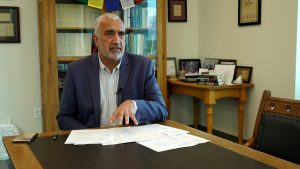
Salt Lake County District Attorney Sim Gill points to several cases impacted by HB227. (Tanner Siegworth)
Instead of moving forward with the scheduled October jury trial, it was postponed, once again. A justification hearing is now scheduled for January, and the trial has been pushed out to June 2022.
“It’s not working in our case,” said Stafford. Even if prosecutors are successful, she says it’s an extra step in a process that’s already been painfully long.
‘It’s excruciating,” Stafford said, of the latest delay.
“It’s another brick in our backpack,” Stafford said the emotional and physical toll of preparing for a trial is something people don’t understand until they’ve gone through it. Now, they’re preparing for an extra hearing she dubbed a “mini-trial.”
“This is going to continue to clog our criminal justice system and retraumatize victims,” Gill said.
‘We’re a leader’
Mitch Vilos is a Utah defense attorney who says he was instrumental in the passage of HB227. “In law school, we learned it’s better to let nine guilty people go free than it is to convict one innocent man,” Vilos explained.
He said one of his main interests is preserving the right of self-defense. He’s authored multiple books on the topic, including one that examines self-defense laws in all 50 states. Research for the book was a massive undertaking, he said and led to his discovery of a unique section of Florida’s Stand Your Ground Law that was amended in 2017.
“And then I thought, ‘Let me mention that to the Legislature,’ and they all thought it was a good idea,” Vilos said.
Vilos said the idea materialized as HB227, bringing Florida’s justification hearing process to Utah.
The intent? Vilos said people should be able to act in self-defense without worrying about the cost of defending themselves later in a trial.
“Hesitating, even a split second, can get you killed,” he said. “And the risk of dying should be on the criminal, or the assailant, not on the defender. And that’s why I proposed this law.”
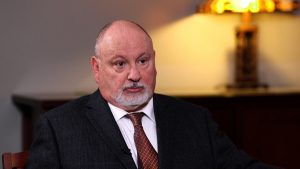
Mitch Vilos is a Utah defense attorney and author of multiple books on self-defense laws. (Ken Fall)
Outside of Florida and now Utah, Vilos did not find any other state with this specific legal process.
When asked whether that makes Utah a leader or a guinea pig, Vilos responded, “Oh, we’re a leader.”
Vilos believes the preliminary hearing process in Utah was turning into a rubber stamp for prosecutors, making it too easy to bind over cases for trial. He wanted a process that would allow more evidence to be presented before trial, with the possibility of avoiding one altogether.
In the chapter of his book, “Self-Defense Laws of All 50 States,” which focuses on Florida laws, Vilos wrote of the immunity provision, “It appears these proceedings can result in a dismissal of charges without a trial.”
Vilos and other supporters of the legislation contend that if prosecutors cannot prove a defendant was not acting in self-defense with clear and convincing evidence during a pre-trial hearing, prosecutors surely won’t be able to prove the charges beyond a reasonable doubt during a trial.
“That whole process saves the innocent citizen of having to pay enormous attorney’s fees to defend themselves at trial,” said Vilos.
He estimates it can cost between $60,000 and $250,000 – and more in high-profile cases – for an individual to defend themselves if charged criminally after a use of force incident.
‘A very terrible guinea pig’
While pitched as a way to save Utahns money, Gill said the new law comes at a cost to victims of crime and taxpayers.
The new process shifts the decision about what is fact from a jury of several people onto one person, a judge. That judge must then rule based on limited evidence presented during pretrial hearings, rather than the totality of the evidence in the case.
And as the law is applied retroactively to older cases, the hearing represents another delay and potentially added costs for all involved, Gill said. He pointed to multiple cases in which a scheduled jury trial has now been postponed after a defendant requested a hearing on whether their use of force was justified. He called it an “added layer” in an already over-burdened system.
In new cases, Gill said the process could lead to charges being dropped as evidence is still being processed.
“We warned of these collateral consequences, those were ignored,” Gill said. “And now the taxpayers are going to pay for it and our victims are going to pay for it.”
Gill’s office and others did warn lawmakers as the bill went through committee hearings.
“Because the standard is so low to request one of these hearings, they will be requested, we think, with an incredible frequency, taxing the courts, taxing victims, taxing prosecutors, and in the end, taxing the system in a way that is really untenable,” said Darcy Goddard, during a Feb. 18 House Judiciary Committee Hearing.
Goddard is the Chief Policy Advisor in the Salt Lake County District Attorney’s office and was one of three people allowed to speak out against the legislation during the hearing. The other two were private citizens.
When it was time for public testimony, 17 members of the public wanted to weigh in on the bill. Citing time constraints, the committee decided to only hear from three individuals who supported the legislation and three who opposed it.
The chair of the Utah Shooting Sports Council, a criminal defense attorney, and a private citizen facing several felony gun charges – who has since requested a justification hearing – spoke in favor of the bill.
Copied-and-pasted from Florida to Utah
“This is a new section of code that basically copies and pastes from Florida statute,” said Rep. Karianne Lisonbee, R-Clearfield, on the floor of Utah’s House of Representatives on Feb. 22.
Lisonbee sponsored the bill.
“Currently, individuals who use their firearm in self-defense are subject to prosecution and often a costly jury trial,” she said.
Lisonbee said she’d heard from conceal carry permit instructors who teach about the legal liability of shooting someone.
“When they get to the portion of their class where they explain defending yourself in a court of law – in the, under the horrendous circumstance where you’ve had to use your firearm in self-defense, how expensive that can be and how difficult that can be – they have had people walk out of their class saying, ‘I would rather die than financially ruin my family,’” Lisonbee said.
HB227, she said, would protect Utahns from financial ruin “in the event of a true act of self-defense.”
But Rep. Brian King, D-Salt Lake City, raised concerns about the bill and its significant proposed changes to the criminal justice system.
“The decision on the part of a prosecutor to charge in the first place would undoubtedly have taken place – would have taken into account whether the individual that was considered being charged was justified in using deadly force,” he said.
King warned of potential unintended consequences, saying he wanted to hear more from those in law enforcement and the prosecutorial community.
“We may be, in fact, encouraging or giving tacit approval to a more aggressive use of deadly force than is wise from a public safety and a public policy perspective,” King said.
While HB227 is modeled after Florida law, it does not mirror it entirely. Acting on feedback from victims’ advocates and others, Lisonbee made changes to the final version of the legislation that prevent the new law from being applied to domestic violence cases.
The law also does not apply in cases where the defendant has used force against a law enforcement officer, but it does apply to law enforcement officers who are charged with unlawful use of force.
The House passed the legislation with less than 15 minutes of debate. It cleared the Senate with no debate.
In the final vote in the House, 56 members supported the bill while 17, including King, voted against it.
In the Senate, the bill passed with a vote of 22-5.
Gov. Spencer Cox signed the bill into law on March 16 and it went into effect on May 5.
‘A get out of jail free card’
Since then, Gill said the new law is not just impacting cases involving gun owners. He is seeing defendants in all kinds of cases request justification hearings.
“Everything from homicides to serious bodily injuries, aggravated assault, or prison riot, and finally, discharge of weapons,” Gill said. “… I have one person who’s stabbing another person, I have another person beating somebody over the head with a rock, and these are all now becoming evidentiary justification hearings.”
The case surrounding Cory Haney’s death also did not involve a gun. Stafford said her son was unarmed and stabbed several times.
“He was stabbed, brutally,” she said. “It was horrible.”
“Anyone under existing law can defend themselves,” said Allison Anderman, senior counsel with the Gifford’s Law Center.
Both Anderman and Gill say self-defense is a recognized affirmative defense, already built into the tradition of the criminal justice system. People could always claim self-defense prior to HB227, and it’s a possibility prosecutors weigh before bringing charges.
“Prosecution is going to file those charges where we believe the self-defense is not applicable,” Gill said. “And then, in the rare case that we misfile that or there’s a genuine issue to be contested, then we can contest that. And that was the rarity because everybody’s doing their job diligently and thoroughly. This basically opens up the floodgates.”
Anderman said the new law makes it more difficult for prosecutors to hold bad actors accountable.
“That is just a total turning the entire criminal prosecution on its head and making it much easier for people who shoot and kill other people to evade justice,” said Anderman.
She said people charged with crimes are going to use whatever tools are available to exonerate themselves – this new law creates the potential for charges to be dismissed without careful consideration by a jury.
“Essentially, you know, the Utah Legislature has given people a get out of jail free card for murdering other people,” said Anderman.
HB227’s sponsor
The KSL Investigators sat down with Lisonbee for an interview to share the concerns about the law she sponsored and how it is impacting some victims and their loved ones, including Haney’s family.
When asked whether she considered that the law could incentivize frivolous self-defense claims, Lisonbee said, “I think if we look at the statute as a whole and weigh all of the provisions, I am not concerned with that.”
Lisonbee was also asked whether she is open to making changes to the law if it’s not working as intended.
“I think we have to always take a look at statutes ongoing, that’s part of the process,” she said. “I do think this is a well-balanced statute, but again, open to feedback.”
After about 10 minutes, Lisonbee ended the conversation abruptly, saying, “You asked me for four questions and you’ve gone well beyond and outside the scope of those questions,” before she stood up and walked away.
But the KSL Investigative team does not send questions in advance of interviews, which we made clear in our emails with Lisonbee. The emails show the interview was requested for a report “intended to be an in-depth examination of how the legislation is impacting cases here in Utah,” and Lisonbee received four general topics for the interview including, “how the new law is working in practice.”
Two days later, Lisonbee agreed to continue the conversation about HB227 in a second on-camera interview.
“I believe it’s functioning in the state,” she said.
Lisonbee said the law was intended to address politically motivated prosecutions but could not provide examples of that happening in Utah.
“There may be cases,” she said. “I don’t know of any, but I do know that they are happening.”
Lisonbee said after reaching out to several groups and agencies, she doesn’t believe there are serious issues with the new legislation.
“Nobody could back up the assertion that there are broad concerns out there,” she said.
Prosecutor poll
The KSL Investigators reached out to the top prosecutor in each of Utah’s 29 counties with questions about HB227 and 20 responded. Most said because the law is so new, it hasn’t impacted them yet.
In six counties with scheduled justification hearings, none of the prosecutors said they support the law. Three said they’re either undecided or neutral. Three said they’re against it.
Rob Van Dyke, county attorney in Kane County, described his position as neutral. He said he helped work on HB227 and was grateful domestic violence cases were excluded from the law’s reach.
“These are very tough cases where the abuser often has a lot of power and control over their victim,” he wrote in an emailed response. “Adding an additional hearing to ferret out an often-bogus claim of self-defense by a domestic violence abuser could have been a serious blow to helping protect these vulnerable victims.”
At the beginning of the month, Van Dyke said only one defendant in his county had requested a justification hearing and it had not yet taken place – but could prove helpful in addressing the issue before trial.
As lawmakers considered the bill during legislative committee hearings in February, Van Dyke spoke out against it, saying it would likely not accomplish the stated goal of saving defendants money.
Rich County Attorney Ben Willoughby said he is undecided, as the law has not impacted a case in his county yet but did question whether the change was necessary.
“…self-defense was determined once, by a jury, using the highest standard in the law: proof beyond a reasonable doubt,” he wrote in an emailed response. “That’s a pretty good system. The jury system works. What’s changed?”
Murder charged dismissed
Among prosecutors who oppose HB227 is Ryan Peters in Juab County, where a murder charge was thrown out after an August justification hearing that is believed to be the first in the state.
Fourth District Court Judge Anthony Howell called it the most difficult decision he’s ever been asked to make and said he hoped lawmakers would take notice.
“I hope they will evaluate whether this new statute has had the results they intended,” Howell said, addressing parties in the case before announcing his decision. “And if my decision is not what the Legislature intended, I hope they will take corrective action.”
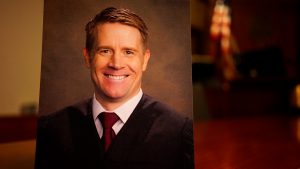
Fourth District Court Judge Anthony Howell presided over a justification hearing in August. (Tanner Siegworth)
Howell said the jury system is fundamental to the state’s criminal justice system.
“The court decides whether the matter can be tried by a jury,” he said. “But it’s the citizens of the community who decide whether a defendant is guilty or not.”
HB227 changes that process, something Howell has now experienced first-hand.
“I do not relish exercising this new mandated authority,” Howell said.
Ultimately, a murder charge against Troy James Pexton was dismissed. Pexton, 57, claimed his use of force was justified after shooting and killing his friend, 50-year-old Michael Caussey, in November 2020.
According to a document detailing the court’s findings of fact, “six adult male friends went into the West Desert to have fun, shoot guns, visit historical landmarks and natural features, and play cards,” and some of them were drinking.
Pexton allegedly used a gun to break up a drunken brawl between Caussey and Pexton’s cousin. Pexton then dumped Caussey’s body along Brush Wellman Road, the judge wrote.
“There are certainly arguments and inferences that Mr. Pexton’s behavior after killing Mr. Caussey might be suspect,” Howell said, “but his actions are also consistent with innocent behavior.”
Howell noted he had questions that remain unanswered but ruled the state had not met its burden to show clear and convincing evidence that Pexton’s use of force was not justified.
A jury could have reached the same decision after evaluating all the evidence, but Caussey’s loved ones will never know.
Once the murder charge was dismissed, Pexton resolved the case with a “no contest” plea in abeyance to a reduced misdemeanor charge of attempted desecration of a dead human body.
“We all feel the justice system has no doubt failed us,” said one family member, according to court audio recordings.
Another family member told the court, “This has forever changed my outlook on the system and the faith that I once had that justice would prevail.”
Howell encouraged the prosecutor to appeal his decision and said, “For those who will undoubtedly leave today feeling that justice has not been done, I encourage you to seek out your representatives and discuss your concerns.”
Lisonbee stands by the outcome of the case.
“He shouldn’t have to face a jury trial,” she said of Pexton. “He should be able to avoid that emotional and legal expense.”
Florida’s SB128
Lisonbee said she reviewed data from Florida that shows the provision HB227 is based on is working there.
“We looked at some of the stakeholder feedback on the law in Florida and we felt that it would be appropriate to bring it here and that it was well-balanced,” she said.
KSL asked to see that data multiple times. Lisonbee has not provided any data.
However, legislative analysis of the proposed 2017 amendment to Florida law, SB128, predicted the provision could incentivize self-defense claims and lead to additional costs for public defenders, prosecutors, and the court system.
“Because the burden shifts to the prosecution, more defendants may have an incentive to claim the right to immunity,” the analysis stated. “However, these additional costs of pretrial immunity hearings may cause prosecutors to be more selective in pursuing charges for the unlawful use of force. Also, some cases that would have gone to trial may be resolved by the immunity hearing or encourage plea bargains when the state prevails at the pretrial hearings.”
The analysis document stated Florida’s Office of the State Courts Administrator could not accurately determine the fiscal impact of the bill at the time due to a lack of available data.
Anderman with the Gifford’s Law Center cited research finding states that have implemented Stand Your Ground Laws recorded increases in violence and homicides:
“As Stand Your Ground laws spread from Florida across the country, researchers have found that these laws are also associated with increases in firearm homicides, hospitalizations, and injuries elsewhere, without the promised benefits in crime reduction.”
The report, updated in May, also includes findings that Florida’s Stand Your Ground Law has had a significant racially discriminatory impact:
“An analysis of Stand Your Ground cases in Florida found “striking evidence” of racial bias. Defendants invoking Stand Your Ground defenses were twice as likely to be convicted for killing white victims compared to non-white victims. In Florida, Black adolescents comprised 63.5% of all adolescent firearm homicide victims before passage of the state’s Stand Your Ground law. After the law was enacted, that number rose to 72%.”
While the data in the Gifford’s Law Center report is based on the entirety of Florida’s Stand Your Ground Law and HB227 is only modeled after the portion of it that was amended in 2017, Anderman said modeling statutes after Florida’s law is likely to bring similar results.
“When Utah copies Florida’s law, it’s also probably going to copy the impacts,” Anderman said.
A limited appeal process
When pressed about the unintended consequences of HB227 on victims of crime and their families, Lisonbee said people who act in self-defense in Utah are victims.
“I heard from victims, and I acted and that’s the result – HB227, and I’m grateful that I can represent those victims,” Lisonbee said.
When asked to address people who feel the new law could deprive them of a decision made by a jury, Lisonbee pointed to the appeal process.
“The state can always appeal,” she said.
But prosecutors say that’s not true.
“It is a misnomer to think that that is an available, active remedy that’s available to victims,” said Gill.
The Utah Attorney General’s Office is the only agency that can appeal felony cases, he explained.
“It’s not an automatic appeal that I get to do and it’s not an automatic appeal that the victims’ families will have,” Gill said. “It is at the discretion of the attorney general, who we would need to convince, and if they’re willing to take it on.”
Appeals must also be made within 30 days, Gill said, otherwise, it’s simply too late – even if new, damning evidence is uncovered later. Because charges are dismissed with prejudice after a justification hearing, refiling charges would constitute double jeopardy.
Despite urging from the presiding judge, the state did not appeal the first justification ruling in Juab County.
“In Utah, the Attorney General’s Office has exclusive jurisdiction to file felony appeals, though they take into careful consideration the opinion of county attorneys,” prosecutor Ryan Peters wrote in an emailed statement.
“In consultation with the Attorney General’s Office, after an in-depth conversation with the victim’s family, the Attorney General’s Office and my office jointly decided against filing an appeal of the district court’s justification ruling.”
‘No silver lining’
“I think it’s difficult for victims,” said Laurel Hanks, an attorney with the Utah Crime Victims Legal Clinic.
Hanks represented Caussey’s family members in the justification hearing in Juab County in August and is preparing to represent Haney’s family in the justification hearing in January.
The victims Hanks helps are not the accused, but rather people who’ve lost loved ones and want answers.
Now, she’s tasked with explaining to them why their cases could be delayed with an extra hearing or cut short altogether, should charges be dismissed during a justification hearing.
“Honestly, I don’t even know what to tell them because there are no words to describe what they’ve lost,” Hanks said.
She said for many grieving families, the prospect of a decision made by a jury after a review of all the evidence is the one thing they’re holding onto.
“There’s really no silver lining anywhere for them,” she said.
Hanks said she hopes lawmakers will get more information about how HB227 impacts real people.
People like Kay Lynn Stafford, a mom facing another holiday season without her child – her chance for justice now hanging in the balance.
“It’s my son’s life,” she said. “He’s gone. He can’t come back. And he needs his story to be heard. And he needs a jury to make that decision.”
Have you experienced something you think just isn’t right? The KSL Investigators want to help. Submit your tip at investigates@ksl.com or 385-707-6153 so we can get working for you.

